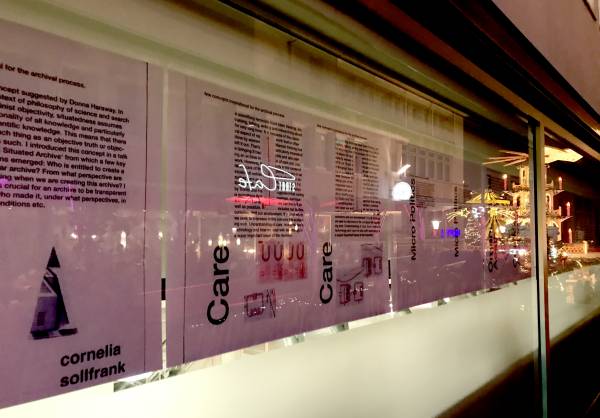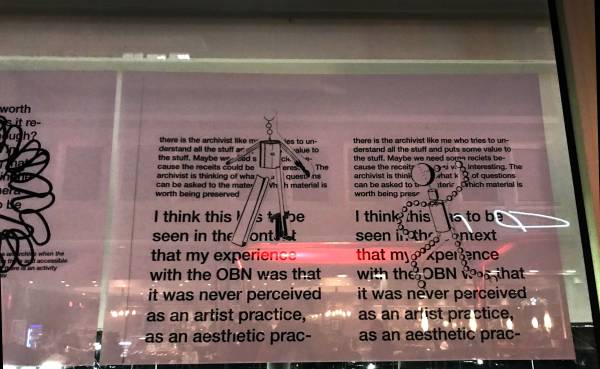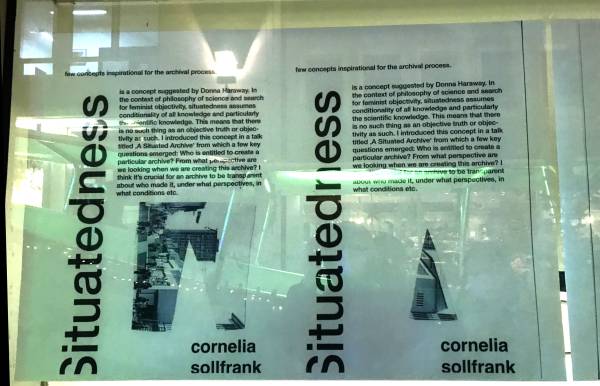This is an old revision of the document!
obn_archive at ruruHaus, Kassel (obn posters, part of the zine »Manual for the Dying«)
photos by malin kuht, december 2021
A Situated Archive of the Old Boys Network and its Discontents. Talk with Cornelia Sollfrank
Thursday, 2 September 2021, 17:00-19:00 CET
Hybrid event, on site in Kassel at ruru-house and online
Explorative talk with artist/researcher and pioneer of cyberfeminism Cornelia Sollfrank about the creation of an archive of the Old Boys Network (1997-2001).
The documenta archiv is working on the project “Manual for the Dying” together with the team of ruangrupa, the artistic director of documenta fifteen, the curator Frederikke Hansen and the artistic editor Erick Beltran.
obn_archive is a project of documenta studies at Kunsthochschule Kassel in collaboration with documenta archiv.
Being bestowed with the estate of a dying or departed artist or a disbanded artist group can be an overwhelming task, especially if the work has not been identified, registered, and archived in preparation of this ‘afterlife’ by either the artist or the support system surrounding the person, or collective. Other artists who know that they will die soon do not know how they can make their legacy available for future parties, because they find no interest and support while alive. Many of those who end up taking responsibility for the legacy are not equipped for the specialized tasks of locating, preserving, and making it accessible to the public.
Based on a collaboration with documenta archiv and a series of explorative talks and workshops on how to prepare for one’s death respectively caring for an estate, a publication shall serve as a practical guide for dying artists and the bereaved alike. The output of the manual could be a small book along with a podcast series, a series of booklets, or a classic handbook on the practical issues of (self-)archiving and legacy planning on the one hand and, on the other, discussions on interests and ethics of institutional and commercial stakeholders and researchers, decolonizing instead of patronizing approaches etc.
The artist Cornelia Sollfrank, will talk about the OBN archive and the plans for its processing, indexing and future storage during the Kassel museums week KW 35 at ruru-Haus, thus opening the series of explorative talks. Sollfrank is a pioneer of cyberfeminism in the 1990s, co-founder of OBN (Old Boys Network) in 1997 and participant in documenta 10 as part of Hybrid Workspace.
Further information here: https://www.documenta-archiv.de/en/aktuell/termine/2546/a-situated-archive-of-the-old-boys-network-and-its-discontents-talk-with-cornelia-sollfrank[[http://example.com|External Link]]
_
How can we maintain what we care about? Collaborative archiving strategies for the Old Boys Network
Friday, 23 April 2021, 18:00 CET
Online talk
Via video conference (zoom): https://zoom.us/j/91882503983
Inputs and subsequent discussion with Dušan Barok, Mela Dávila-Freire, Michael Hiltbrunner and Laurence Rassel introduced and moderated by Cornelia Sollfrank.
The Old Boys Network described itself as »the first international cyberfeminist alliance.« Founded in 1997, the connecting element of the network was the term ›cyberfeminism‹. The formulated concern of the organization was »to create spaces in which cyberfeminists can research, experiment, communicate and act. Such spaces include virtual ones such as the cyberfeminist server and the mailing list as well as temporary meetings such as workshops and international conferences. All the activities have the purpose of providing a contextualized presence for different artistic, theoretical and political formulations related to cyberfeminism. At times mysterious, at times transparent, OBN is setting an agenda for communication, intervention and production«. (https://obn.org/) A group of enthusiasts is currently working to create a living archive of this self-organization work, making its experiences accessible to subsequent groups.
The guests of the event all have practical experience in building archives, archives within large or small institutions, independent archives or archives at the interface of institutions and activist/self-organized groups. Referring to specific projects, the discussion will address questions of objectivity, sustainability, scale ans licensing.
The event series Networks of Care creates a platform for the exchange of ideas on how to preserve temporary, ephemeral, project-based or collective practices. What strategies can transmit embodied knowledge? This will be discussed specifically in regard to political, ethical and economic implications of different forms of preservation beyond the standardization through existing preservation conventions. The goal is to develop models for the institutional and cultural-political handling of im/material cultural artifacts, based on a need for analysis, among other things.
nGbK project group: Nanne Buurman, Friederike Schäfer, Anna Schäffler, Cornelia Sollfrank, Antje Weitzel
SPEAKERS & ABSTRACTS
Mela Dávila-Freire is a curator, researcher and consultant with a long-standing expertise in artist publications and the development of archives for art institutions such as Macba in Barcelona and Museo Reina Sofia. Most recently she has worked as a consultant for the exhibition „Documenta. Politics and Art“ that will open at Deutsches Historisches Museum Berlin in June this year. More information at: www.artfile.es
What happens when the archive becomes the interface of contact between an art institution and a group of activists? The Queer Archive? project at Museo Reina Sofía highlights the frictions that may arise when institution and activism, whose objectives and methods are not easy to reconcile in practice, work hand in hand in the construction of a documentary archive.
https://www.museoreinasofia.es/en/exhibitions/queer-archive
Michael Hiltbrunner is a cultural anthropologist and art scholar at the Institute for Contemporary Art Research at Zurich University of the Arts. His recent research focuses on personal archives of research-based art and the F+F School in Zurich as a lab for experimental design. He also works as an independent curator and lectures on art theory and cultural analysis.
Michael will give us an insight in the work he has been doing with the archive of the F+F school. The school was founded in 1971 as an alternative to public art and design schools with the idea to integrate grassroots democracy, radical education, political aesthetics, social critique and also conduct research. In the more than 50 years of its existence, the school not only educated generations of artists and designers but also produced tons of documents waiting to be organized in an archive. Building this archive not only allows to understand the spirit of the time in which it was founded but also allows to draw parallels to our current education system.
You can have a look at the building site:
https://ff1971.ch
https://786atom-ais.docuteam.cloud
https://www.zhdk.ch/en/researchproject/575698
Dušan Barok is founder of the artist-run platform for arts, media and humanities Monoskop (http://monoskop.org) and a PhD candidate in Memory Studies at the University of Amsterdam. In his thesis he approaches publishing as a strategy for art preservation. Dušan is also coordinator of the project New Media Museums: Creating Framework for Preserving and Collecting Media Arts in Central Europe, and collaborates with a range of organisations presenting, supporting and preserving visual art.
Departing from my experience with Monoskop and other digital archiving initiatives I've been involved with in the past years I would like to bring in some of the questions to which I return again and again… what does it take to maintain a digital resource?; how do we set the criteria for what should be kept?; how to preserve and support contexts, not just a collection of individual items?; is there an option of not perpetuating the online hegemony of data extractivism and surveillance?; what are the consequences of accepting that archives are temporary?
Currently Laurence Rassel acts as director of the art school ERG, École de Recherche Graphique (http://wiki.erg.be), in Brussels. From 2008 to 2015 she was Director of Fundació Antoni Tàpies, Barcelona, www.fundaciotapies.org/) an institution created in 1984 by the artist Antoni Tàpies to promote the study and knowledge of modern and contemporary art. From 1997 to 2008, she was member of Constant, a non-profit association and interdisciplinary arts-lab based and active in Brussels dealing with art, free software, copyright alternatives and feminism (http://www.constantvzw.org/).
How can we maintain what we care about when we are not anymore the ones responsible to take care of it? How do we define care.
From 2007 till 2015, I developed with the team of the Fundació Antoni Tàpies in Barcelona (an institution created in 1984 by the artist Antoni Tàpies to promote the study and knowledge of modern and contemporary art and to maintain and show his own art work), a now disappeared open archive project named Arts combinatòries. Based on this experience, I will share the questions that emerged at the disappearance of the project as a space in real life and on line: How can we maintain what we care about? How can we maintain what we care about when we are not any more the ones responsible to take care of it? Digitizing, open access, free and open source software are no guarantee of sustainability. How do we transfer care? Through contracts? Through affect? We cannot think the archive without thinking the ecosystem it will be included in. And first of all, what did we project as the role of the archive, the institution within it is placed under the care of. How do we define care? How did I? And failed. What did I learn and can share with the “collaborative archiving strategies for the Old Boys Network”?


